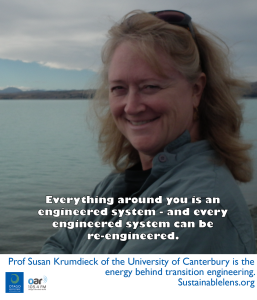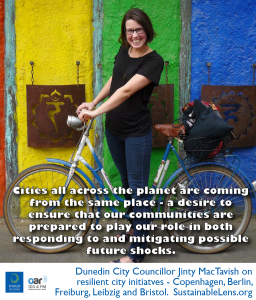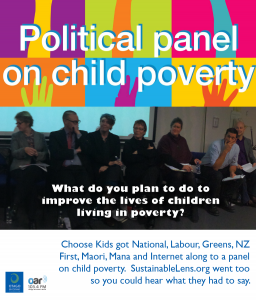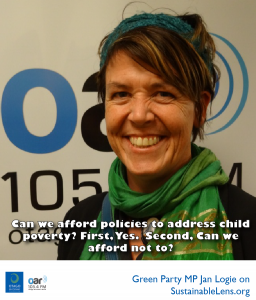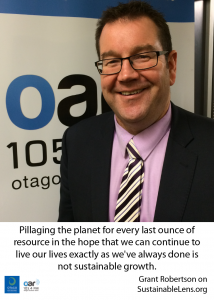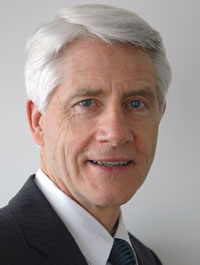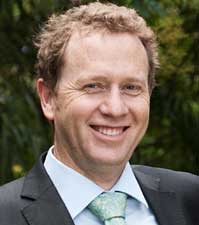Everything around you is an engineered system – start demanding of the engineers to change things.
Prof Susan Krumdieck is developing Transition Engineering at the University of Canterbury. We talk about green energy mythologies, transition engineering of complex systems, growing up in Colorado, and how her son’s persistent questioning led her to look for ways or making real change.
Talking points
My concern is what we are doing that is not sustainable, and changing that – transition engineering.
People can adapt to whatever situation they’re in, and they can do that if they have the ability to see what’s happening, understand what’s happening, trust one another and work together on it.
Mechanical engineers have made these big systems work really well, but they have not been given the task of winding them down in a way that is sustainable.
The conundrum, that if you are going to engineer your systems even more tso that you can overcome bad behaviour – you’ve introduced more reliance on the engineered system instead of reliance on people thinking.
How engineering interacts with people is at the core of sustainability
We tell ourselves these big stories – and then start to believe them.
Green energy mythologies – may be as important as mythologies have always been for people – that we have a belief in our own progress and in our own development, and
we need stories and mythologies that support that belief. But the facts tell us we are in trouble.
Our development, our progress – that we’ve been so success at is a trap, and a bit suicidal – a lot suicidal – and we don’t know how to deal with that except to believe more in the story.
The party we’ve been having – we’ve come to a trough that is bottomless, an all-you-can-eat banquet with a free returns card, and we we’ve come to think that’s how things are, but we gotten quite obese – it’s not good for us, it will kill us, and yet we’re afraid of change.
We know continued growth is doomed, so we’ve shifted our growth over to the green category – it’s still doomed, the miracle green energy is a myth.
Basically anything that anybody sends you with a big “Yay!” Solar roads, house batteries…everybody, your green energy myth radar should just ping.
Solar panels…something that says to people something about you that you will probably be quite smug about…it will fulfil an emotional need that you have, but what
I call it is green bling. – you didn’t need it, it didn’t change your circumstances or add value to your life. It is decoration for your house, not a legitimate part of the energy system. But something you couldn’t see – perhaps insulation – would make so much more difference.
If we really want to talk about the route to sustainable, what we really have to talk about is what is not sustainable – that’s it.
We’ll never really be sustainable. All we can do is look at the most stupid things we do, and tell the engineers that are making them “thank you very much, but we want something that isn’t that bad, we want you to rethink this.
Anything that is disposable, not reusable, not returnable – all of those we’re engineered that way on purpose, we can change that.
Engineering has to be where we start with these changes.
Somebody has to actually do things that changes things – transition engineering.
Adaptive change have to be engineered – it has to be done on purpose.
Green energy myths give false hope.
Simple solutions might be the answer, but they have to be real.
The way we use energy has become so embedded in our social structure and our belief system – we’re talking a fundamental change in our shared cultural values.
It is possible to do change- to take on what seemed like impossible situations. We’ve done it before in safety engineering and environmental engineering.
You can’t solve the world in one do, so frame the problem – every engineered system can be re-engineered.
The entire profession is responsible for everything that we’ve done that is unsustainable.
We’ve reached a point where our progress, our own technological success is indeed the biggest threat to us.
At the turn of the last Century, our factories, mines and transport were engineered in a way that they were extremely successful for the owners, investors making huge amounts of money…but people were dying or being maimed at rates we can’t contemplate today…so there was a huge change over 40-50 years – that was the impact of safety engineering.
The change was exponential, so huge at the beginning – so simply think about what’s wrong and work on that.
When we make a big mess we need the engineering field to look at itself and say “we can do better than this”.
Everything around you is an engineered system – start demanding of the engineers to change things.
You are in a system that is engineered to work beautifully, it is also self destructive, it is also designed to fail.
Turn around and look at the people who designed these systems and say “I hope you’re busy figuring out how to change things”.
We need the emergence of transition engineering just like we needed safety engineering, natural hazard engineering, environmental engineering.
We’ve got ourselves into a progress trap, we’ve done a very good job and now it is the biggest threat to ourselves and we need to figure that out. We as engineers need to get together and do what we do and get this sorted out.
Most people don’t understand what is going on behind the engineering curtain, but they can demand that engineers fix this stuff they’ve made.
(Activist?) Indeed an activist within the engineering profession. I am pushing the comfort zone of the engineering professional to challenge them to take on this responsibility.
They say “we already do sustainability engineering – recycling systems and so on” but this is a bolt-on to unsustainable systems. We need engineering to boldly take on the big unsustainable systems.
I wish solar, wind, hydrogen were miracle solutions, but they’re not.
If I can help any engineer not waste the ten years I wasted on Hydrogen, then that gets us closer to real change.
Transition is about change, about changing engineering, and if you can change engineering, you can change the world.
(Motivation) My son said “Mom, you have to do something, if something doesn’t change then it’s going to be really bad, you have to figure out how to change things”.
There’s a future out there where we have changed things now. In 100 years we people look back, it’s a good thing that that thing happened. What is that thing?
Anyone who is trying to work on a positive outcome is part of the positive outcome.
The difference between a future where the experiment we started a couple of hundred years ago, the future where we keep hoping for green technology miracles and the don’t come but we keep hoping and telling ourselves that story as civilisation winds down in not a nice way and in the meantime they didn’t change to make the climate more liveable, and a different future, where something profound happened.
Ask 100 people what changed 100 years ago that made a profound change, not one would say “safety engineering”.
(Challenge?) Establish transition engineering
(Miracle?) I think about this all the time – what is the trigger point for change? For me it is funding to establish transition engineering.
(Advice?) Stay with the math and science, especially the young women. We need people who understand that it’s complex systems but you can change them – you just have to think in systemic ways – and if we could could get women to be half of the tiny percentage of people who are engineers, we’d we well on our way.
Do not accept anything less than a global perspective, learn what is known but do not accept that we have to cook this planet as part of human requirements.
